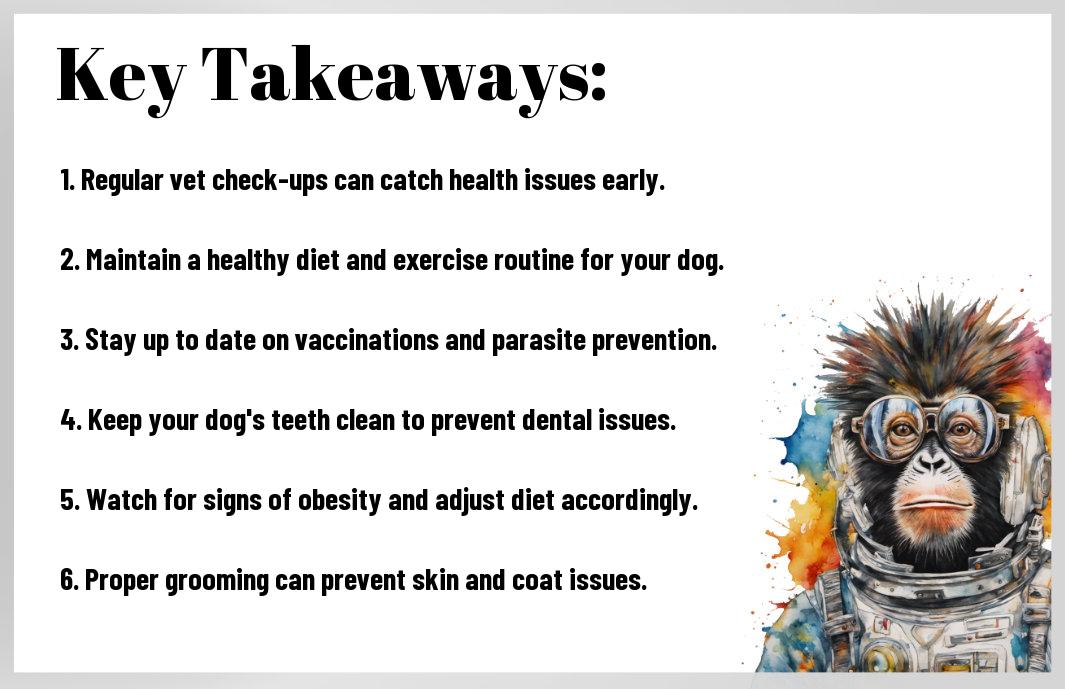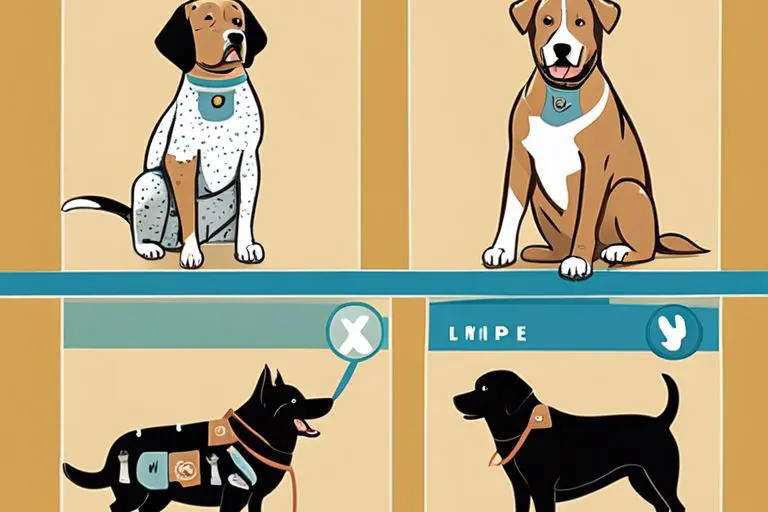Dogs are beloved members of our families, but they can face various health issues that can affect their well-being. Preventing these common health issues is key to ensuring a long and happy life for our furry friends. From obesity to heartworm, being aware of these preventable conditions can help protect our dogs and keep them healthy. In this blog post, we will discuss five common health issues that dogs may encounter and provide tips on how to prevent them, so you can keep your canine companion in the best shape possible.

Obesity in Dogs
Some dogs may struggle with obesity, a common health issue that can have serious consequences if not addressed. To learn more about canine wellness and other common health problems in dogs, check out Canine Wellness: Recognizing Common Dog Health …
Causes of Canine Obesity
To prevent obesity in dogs, it is important to understand the causes behind it. Factors such as overfeeding, lack of exercise, and genetics can contribute to weight gain in dogs. It is necessary to monitor your dog’s diet and activity levels to maintain a healthy weight.
Tips for Maintaining Your Dog’s Ideal Weight
On top of regular exercise and a balanced diet, there are several key tips for maintaining your dog’s ideal weight. Consult with your veterinarian to determine the appropriate portion sizes and feeding schedule for your dog. Avoid feeding table scraps and high-calorie treats that can contribute to weight gain. Though it can be tempting to share food with your furry friend, it is important to prioritize their health over indulgence.
- Regular exercise: Ensure your dog gets enough physical activity to stay fit and healthy.
- Proper portion control: Measure your dog’s food to avoid overfeeding.
- Healthy treats: Opt for nutritious snacks and limit high-calorie treats.
Maintaining your dog’s ideal weight is crucial for their overall health and well-being. Excess weight can lead to joint problems, diabetes, and other health issues. Thus, keeping your dog at a healthy weight is a key part of responsible pet ownership.
Dental Problems
Recognizing Dental Issues in Dogs
Dogs can suffer from various dental problems such as tooth decay, gum disease, and bad breath. It’s important for pet owners to educate themselves on the signs of dental issues in dogs, including discolored teeth, swollen gums, difficulty eating, and excessive drooling.
Preventative Dental Care for Your Furry Friend
On top of recognizing the signs of dental problems, preventative dental care is crucial in keeping your dog’s oral health in check. Regular brushing, dental chews, and professional cleanings are key in preventing plaque buildup, tartar accumulation, and potential tooth loss. Make it a habit to check your dog’s mouth regularly and schedule regular dental check-ups with your veterinarian.
Dental care is not only about keeping your dog’s breath fresh but also about preventing more serious health issues. Untreated dental problems can lead to infections, pain, and even organ damage. By taking proactive measures and giving proper attention to your dog’s dental health, you can ensure a happy and healthy life for your furry friend.
Skin Issues
Common Skin Conditions in Dogs
Conditions such as allergies, infections, parasites, and hot spots are common skin issues that dogs may face. Allergies can be triggered by food, environment, or even flea bites, leading to itching and irritation. Infections can occur due to bacteria or yeast, causing redness and odor. Parasites like fleas and mites can also cause skin irritation, while hot spots can develop from excessive licking or scratching.
Keeping Your Dog’s Skin Healthy
For a healthy skin and coat in your dog, regular grooming is crucial. This includes brushing to remove loose hair and prevent matting, as well as bathing with a gentle dog shampoo to keep the skin clean. Additionally, providing a balanced diet rich in crucial fatty acids can help improve skin health from within.
Skin issues in dogs can cause discomfort and affect their quality of life. It is important to monitor your dog’s skin regularly for any changes in appearance or behavior. If you notice any abnormalities such as redness, bumps, or excessive scratching, consult your veterinarian for proper diagnosis and treatment.
Parasitic Infections
Fleas, Ticks, and Worms, Oh My!
For a dog, dealing with parasites like fleas, ticks, and worms can cause a lot of discomfort and health issues. Fleas can lead to itching, skin irritation, and even transmit diseases. Ticks can transmit dangerous diseases like Lyme disease, while worms like roundworms and hookworms can cause digestive problems and even affect a dog’s heart.
Prevention and Treatment Strategies
Any responsible dog owner knows the importance of preventing and treating parasitic infections in their furry friends. The key to preventing these issues is to maintain regular parasite prevention treatments prescribed by your veterinarian. Regular check-ups and preventive medications can protect your dog from these harmful parasites and keep them healthy and happy.
The vet can recommend the best preventive measures based on your dog’s health and lifestyle. If infestation occurs, they can also provide effective treatment options to eliminate the parasites and prevent re-infestation. By staying proactive and following your vet’s advice, you can protect your beloved pet from parasitic infections.
Joint and Bone Issues
Once again, if you’re looking to learn more about common health issues in dogs, check out this article on 10 Common Dog Health Problems.
Identifying Joint & Bone Problems in Dogs
Identifying joint and bone problems in your dog is crucial for their overall well-being. Watch out for signs such as limping, stiffness, difficulty getting up, or reluctance to go upstairs or jump onto furniture. If you notice any of these symptoms, it’s imperative to consult with your veterinarian for a proper diagnosis.
Strategies for Supporting Joint and Bone Health
The key to supporting your dog’s joint and bone health is through a combination of proper nutrition, regular exercise, and supplements. Regular exercise helps to keep their muscles strong and their joints mobile. High-quality nutrition is imperative for maintaining healthy bones and joints. Additionally, supplements such as glucosamine can help support joint health and reduce inflammation.
This comprehensive approach can help prevent joint and bone issues in your dog, ensuring they lead a happy and active life for years to come.
Final Thoughts
Embracing Preventative Measures
Unlike treating health issues in dogs reactively, prevention is always better than cure. Any pet parent can implement simple measures at home to keep their furry friends healthy and happy. This includes regular exercise, a balanced diet, proper grooming, and scheduled veterinary check-ups. By staying proactive, you can significantly reduce the risk of your dog developing common health issues.
When to Seek Veterinary Help
Any changes in your dog’s behavior, appetite, or physical condition should not be ignored. If you notice persistent symptoms, unusual behaviors, or sudden changes in your dog’s health, it’s crucial to seek veterinary help promptly. A veterinarian can provide a proper diagnosis and recommend the best course of action to address the underlying health issue.
Thoughts: Remember that your dog’s well-being is your responsibility. By being attentive to any signs of discomfort or illness and taking prompt action, you can ensure that your furry companion receives the necessary care and attention to lead a long and healthy life.







